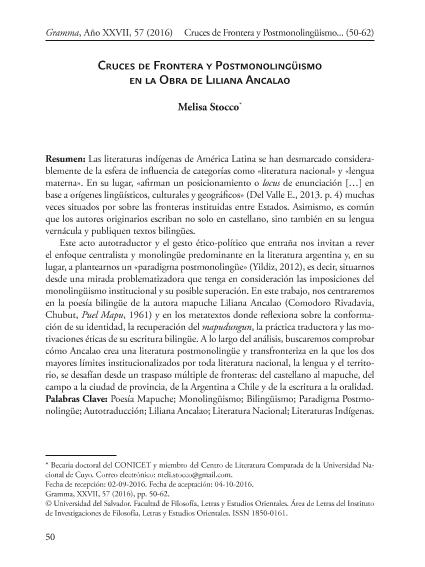Artículo
Las literaturas indígenas de América Latina se han desmarcado considerablemente de la esfera de influencia de categorías como ‘literatura nacional’ y ‘lengua materna’. En su lugar, «afirman un posicionamiento o locus de enunciación (...) en base a orígenes lingüísticos, culturales y geográficos» (Del Valle E., 2013. p. 4) muchas veces situados por sobre las fronteras instituidas entre Estados. Asimismo, es común que los autores originarios escriban no solo en castellano sino también en su lengua vernácula y publiquen textos bilingües.
Este acto autotraductor y el gesto ético-político que entraña nos invitan a rever el enfoque centralista y monolingüe predominante en la literatura argentina y, en su lugar, a plantearnos un ‘paradigma postmonolingüe’ (Yildiz, 2012), es decir, situarnos desde una mirada problematizadora que tenga en consideración las imposiciones del monolingüismo institucional y su posible superación. En este trabajo nos centraremos en la poesía bilingüe de la autora mapuche Liliana Ancalao (Comodoro Rivadavia, Chubut, Puel Mapu, 1961), y en los metatextos donde reflexiona sobre la conformación de su identidad, la recuperación del mapudungun, la práctica traductora y las motivaciones éticas de su escritura bilingüe. A lo largo del análisis buscaremos comprobar cómo Ancalao crea una literatura postmonolingüe y transfronteriza en la que los dos mayores límites institucionalizados por toda literatura nacional, la lengua y el territorio, se desafían desde un traspaso múltiple de fronteras: del castellano al mapuche, del campo a la ciudad de provincia, de Argentina a Chile, y de la escritura a la oralidad. Indigenous literatures in Latin America have considerably detached themselves from the sphere of influence of such categories as «national literature» and «mother tongue». Instead, they affirm a place of enunciation based on linguistic, cultural and geographic origins (Del Valle E., 2013) often located over the borders institutionalized among States. Likewise, it is common for aboriginal authors to write not only in Spanish but also in their vernacular languages and to publish bilingual texts. This self-translating act and the ethical-political gesture it entails invite us to review the centralist and monolingual approach predominant in Argentine literature and to think instead from a «postmonolingual perspective» (Yildiz, 2012), i.e. to problematize the impositions of institutionalized monolingualism and its possible overcoming. We will center the analysis on the bilingual poetry of the Mapuche author Liliana Ancalao (Comodoro Rivadavia, Chubut, Puel Mapu, 1961), and on metatexts where she reflects upon her identity, the recovery of Mapudungun, self-translation, and the ethical motivations of her bilingual writing. We will seek to evince how Ancalao creates a postmonolingual, transborder literature in which the two major limits of every national literature, language and territory, are challenged through multiple shifts: from Spanish to Mapudungun, from the country to the city, from Argentina to Chile, and from writing to orality.
Cruces de frontera y postmonolingüismo en la obra de Liliana Ancalao
Fecha de publicación:
12/2016
Editorial:
Universidad del Salvador
Revista:
Gramma
ISSN:
1850-0153
e-ISSN:
1850-0161
Idioma:
Español
Tipo de recurso:
Artículo publicado
Clasificación temática:
Resumen
Palabras clave:
Poesía Mapuche
,
Bilingüismo
,
Paradigma Postmonolingüe
,
Autotraducción
Archivos asociados
Licencia
Identificadores
Colecciones
Articulos(CCT - MENDOZA)
Articulos de CTRO.CIENTIFICO TECNOL.CONICET - MENDOZA
Articulos de CTRO.CIENTIFICO TECNOL.CONICET - MENDOZA
Citación
Stocco, Melisa Soledad; Cruces de frontera y postmonolingüismo en la obra de Liliana Ancalao; Universidad del Salvador; Gramma; 27; 57; 12-2016; 50-62
Compartir




